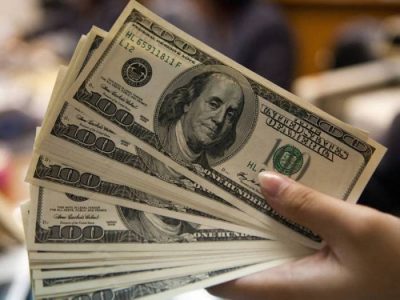Dollar extends losses on Fed move, Donald Trump revives trade war fears

The dollar extended losses in Asia on Thursday after the Federal Reserve stuck to its target for interest rate hikes this year, but fresh fears of a trade war hit equity markets as Donald Trump prepared new sanctions on China.
After one of the most anticipated meetings in recent months, the central bank lifted borrowing costs, as expected, to a decade high but indicated just two more over the rest of the year, confounding forecasts of three more.
Jerome Powell, in his first news conference since taking the helm, said the move was in response to a strong economic outlook that had been helped by December’s tax cuts, while improving jobs creation was lifting incomes and confidence.
In response, the dollar sank against most other units in New York and while the Fed also said it saw a more aggressive path of hikes over the next two years as the economy continues to strengthen, the US unit failed to bounce back. It extended the losses in Asia, with talk of a monetary tightening trend in Europe and Japan adding to its weakness.
“The statement would suggest it’s open season on the dollar and greenlights sellers to re-engage as the Fed failed to confirm any of the markets’ hawkish suspicions,” said Stephen Innes, head of Asia-Pacific trading at OANDA.
The dovish short-term outlook for US borrowing costs provided optimism for Asian investors initially before a broad rally fizzled.
Tokyo ended one percent higher after a three-day losing streak and Seoul closed up 0.4 percent.
Oil builds on gains
But trading floors remain edgy as it emerged Trump is expected to hit China over what Washington calls “theft” of US intellectual property.
The move would further strain tensions with Beijing after the White House unveiled controversial tariffs on imports of steel and aluminium, which sparked fury from world leaders.
China vowed to respond with “necessary measures to resolutely defend its legitimate rights and interests”.
Oxford Economics chief Asia economist Louis Kuijs, said: “The key risk is that it does not end with this modest baseline scenario.
“More measures may follow, and tit-for-tat responses could lead to escalation. Collateral damage in other economies will be significant and could further complicate the trade friction.”
Hong Kong fell 1.1 percent and Shanghai shed 0.5 percent. Earlier on Thursday Hong Kong’s de facto central bank and the People’s bank of China announced measures to tighten their monetary policy.
Singapore fell 0.3 percent and Sydney gave up 0.2 percent while Wellington and Taipei were also lower.
In early European trade, London fell 0.8 percent, Paris shed 0.7 percent and Frankfurt lost one percent.
On oil markets, both main contracts extended Wednesday’s surge following an official report showing US stockpiles fell last week, confirming an industry group’s figures and indicating a pick-up in demand.
Adding to the buying sentiment are brewing geopolitical tensions with speculation about Trump tearing up the Iran nuclear deal mixed with a drop in supplies from crisis-hit Venezuela.
An upbeat assessment on the supply-demand outlook from the Russia-OPEC group that has capped output also provided hopes for further price hikes.
“Oil is roaring higher and there is nothing like a bit of geopolitical tension combined with a clear technical break, and an unexpected draw in inventories to push prices,” said Greg McKenna, chief market strategist at AxiTrader.
– Key figures around 0820 GMT –
Tokyo – Nikkei 225: UP 1.0 percent at 21,591.99 (close)
Hong Kong – Hang Seng: DOWN 1.1 percent at 31,071.05 (close)
London – FTSE 100: DOWN 0.8 percent at 6,981.14
Euro/dollar: UP at $1.2381 from $1.2343 at 2100 GMT
Pound/dollar: UP at $1.4172 from $1.4148
Dollar/yen: DOWN at 105.70 yen from 105.95 yen
Oil – West Texas Intermediate: UP six cents at $65.23 per barrel
Oil – Brent North Sea: UP three cents at $69.50 per barrel
New York – Dow: DOWN 0.2 percent at 24,682.31 (close)
(AFP)

